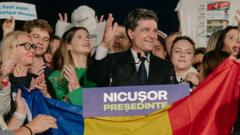In a defining moment for Romania, Nicusor Dan, the liberal and pro-European Union mayor of Bucharest, has triumphed in a fiercely contested presidential election against right-wing nationalist George Simion. Dan secured 53.6% of the vote after months of tumultuous political climate following an annulled election last year due to allegations of Russian meddling.
The election had seen George Simion, leader of the far-right AUR party, gain momentum with a strong showing in the initial round, where he capitalized on public dissatisfaction. However, the eventual victory of Dan, supported by over six million Romanians out of the 11.5 million who cast their ballots, reflects a decisive shift towards a more pro-European agenda.
Celebrations erupted outside Bucharest's City Hall as Dan, a mathematician by trade, embraced his supporters after a long wait for election results. He emphasized the importance of unity in his victory speech, declaring, "We need to build Romania together irrespective of who you voted for." His approach resonated with many voters who expressed concerns about the nationalist rhetoric of his opponent, signaling a collective desire for moderation and change.
Supporters of Dan gathered in large numbers, voicing their hopes for a brighter future for Romania and its children. Voter sentiment was also felt among Romanians abroad, especially in countries like Italy, Spain, and Germany, where Simion had previously found favor in earlier votes but ultimately fell short this time.
Earlier claims of victory by Simion were met with skepticism, particularly as exit polls could not account for the critical overseas vote, leading him to concede after a brief period of denial. A protest initially planned by his supporters quickly dissipated following the announcement.
The election backdrop included a chaotic government collapse earlier this month, exacerbating tensions among Romania's populace. Dan's campaign, focused on combating corruption and maintaining strong ties with Ukraine, starkly contrasted with Simion's nationalist approach, which included calls to reduce aid to Kyiv. Despite Simion's strong performance in the first round of voting, particularly among diaspora voters, the overall sentiments within Romania indicate a preference for European integration and collaboration.
As both Ukrainian President Volodymyr Zelensky and Moldovan President Maia Sandu congratulated Dan on his victory, European Commission President Ursula von der Leyen noted Romanians' overwhelming turnout as a commitment to an inclusive and thriving Romania within a united Europe.
While this election result marked a significant rejection of a more isolationist national agenda, Simion's considerable support base indicates that tensions may continue in the discourse surrounding Romania's political identity and its place within Europe. The ramifications of this election will likely shape Romania's future as the nation navigates its complex political landscape.
The election had seen George Simion, leader of the far-right AUR party, gain momentum with a strong showing in the initial round, where he capitalized on public dissatisfaction. However, the eventual victory of Dan, supported by over six million Romanians out of the 11.5 million who cast their ballots, reflects a decisive shift towards a more pro-European agenda.
Celebrations erupted outside Bucharest's City Hall as Dan, a mathematician by trade, embraced his supporters after a long wait for election results. He emphasized the importance of unity in his victory speech, declaring, "We need to build Romania together irrespective of who you voted for." His approach resonated with many voters who expressed concerns about the nationalist rhetoric of his opponent, signaling a collective desire for moderation and change.
Supporters of Dan gathered in large numbers, voicing their hopes for a brighter future for Romania and its children. Voter sentiment was also felt among Romanians abroad, especially in countries like Italy, Spain, and Germany, where Simion had previously found favor in earlier votes but ultimately fell short this time.
Earlier claims of victory by Simion were met with skepticism, particularly as exit polls could not account for the critical overseas vote, leading him to concede after a brief period of denial. A protest initially planned by his supporters quickly dissipated following the announcement.
The election backdrop included a chaotic government collapse earlier this month, exacerbating tensions among Romania's populace. Dan's campaign, focused on combating corruption and maintaining strong ties with Ukraine, starkly contrasted with Simion's nationalist approach, which included calls to reduce aid to Kyiv. Despite Simion's strong performance in the first round of voting, particularly among diaspora voters, the overall sentiments within Romania indicate a preference for European integration and collaboration.
As both Ukrainian President Volodymyr Zelensky and Moldovan President Maia Sandu congratulated Dan on his victory, European Commission President Ursula von der Leyen noted Romanians' overwhelming turnout as a commitment to an inclusive and thriving Romania within a united Europe.
While this election result marked a significant rejection of a more isolationist national agenda, Simion's considerable support base indicates that tensions may continue in the discourse surrounding Romania's political identity and its place within Europe. The ramifications of this election will likely shape Romania's future as the nation navigates its complex political landscape.



















